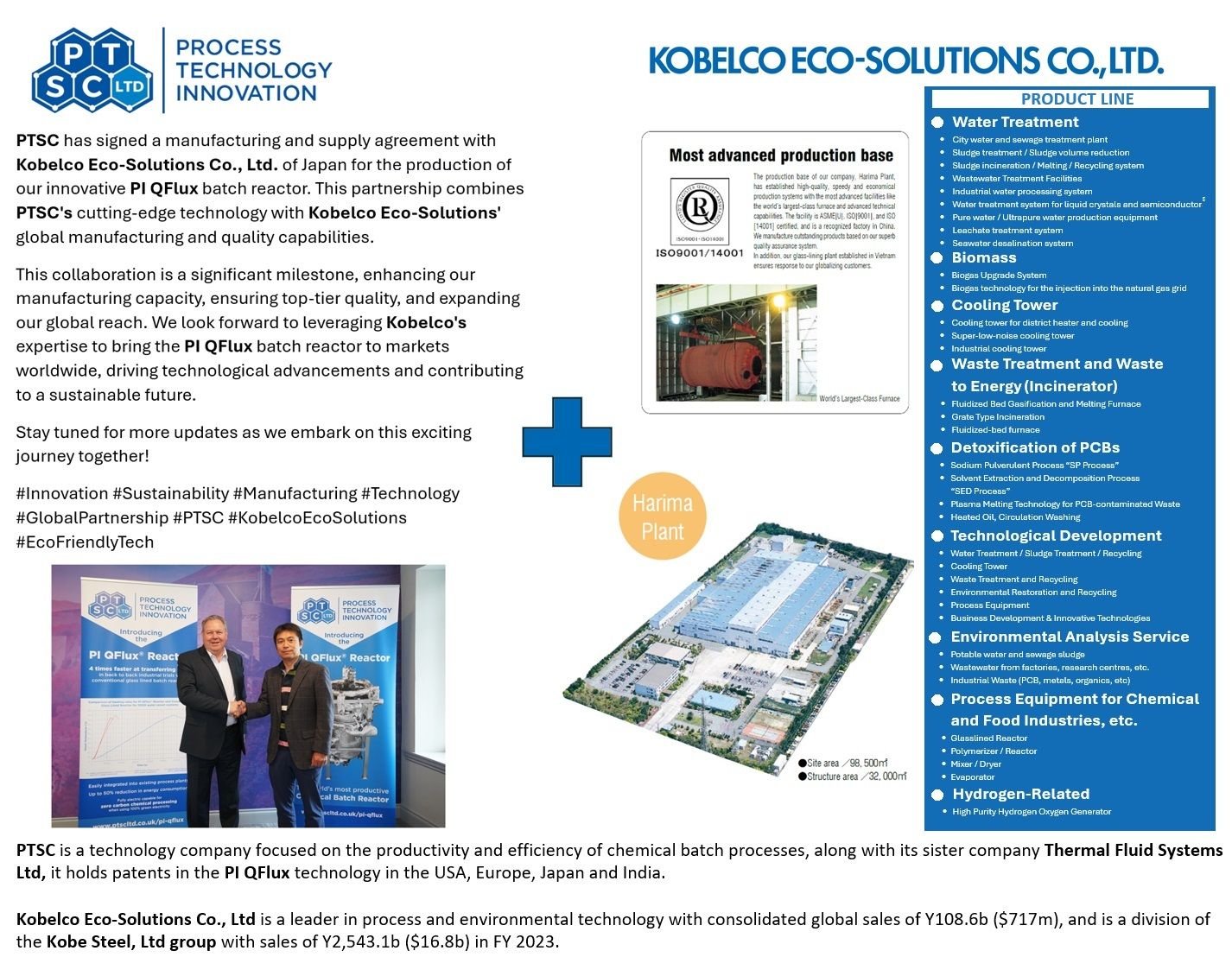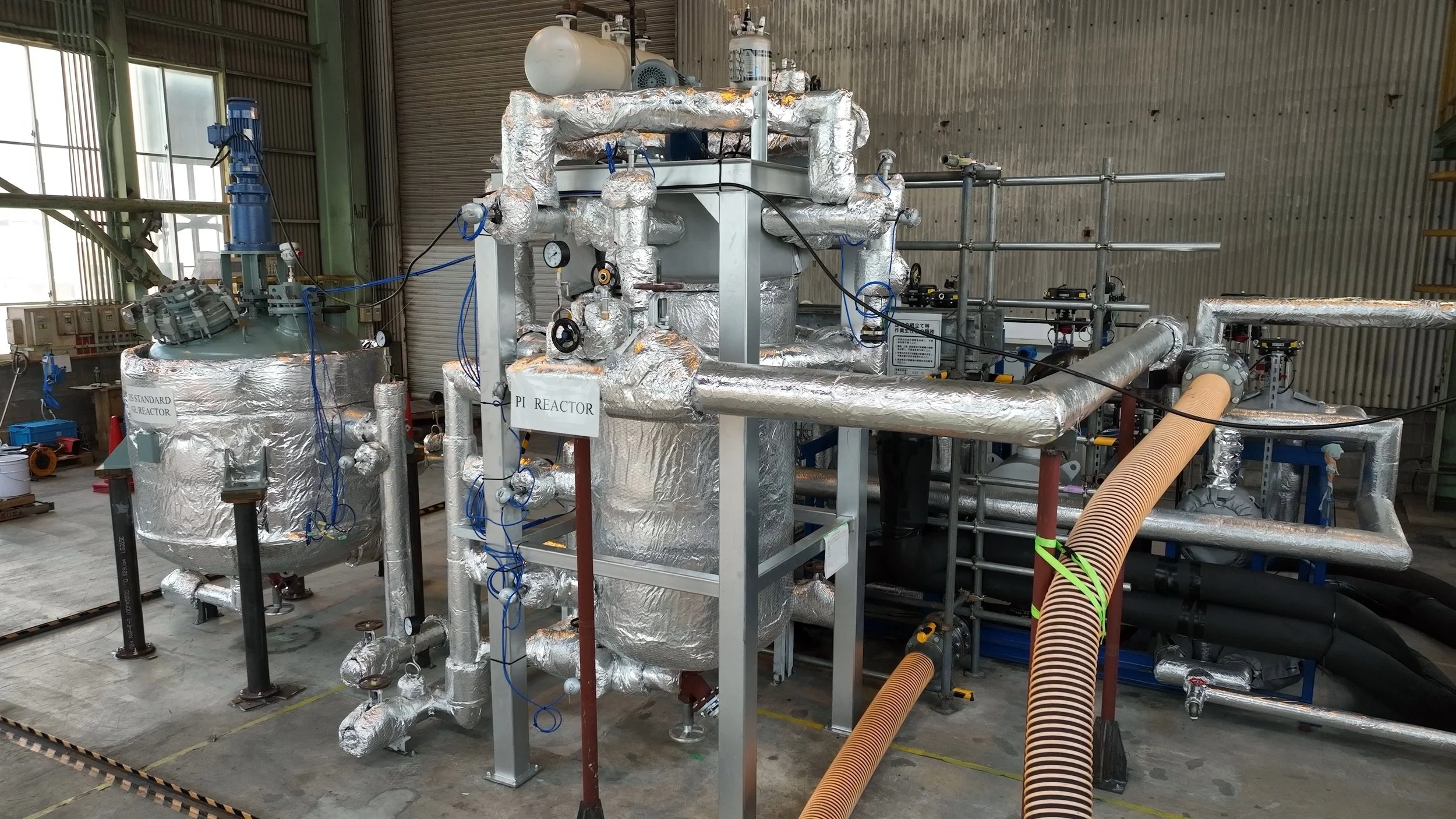PI QFlux Reactor
A revolution in Chemical Batch Technology.
PTSC has carried out extensive testing of its PI QFlux batch reactor vs an equivalent sized industry traditional batch reactor. Both reactors were constructed in glass lined steel and both operated with the same service connections.
Within one day of testing starting and continuously afterwards, the PI QFlux faultlessly achieved a heating/cooling rate 4 times higher than that of the conventional reactor due to both the unique design of the PI QFlux reactor itself and the PTSC/TFS designed TCU. Importantly and in combination, the patented design of the PI QFlux resulted in up to 50% reduction in primary heat energy consumption over that of the conventional reactor, whilst performing this feat.
PTSC who provided the PI QFlux technology as well as the new design of TCU were greatly supported in the test by Kobelco Eco Solutions Japan, who constructed the test centre and provided all of the process infrastructure required to carry out such a large full scale production trial.
August 12th 2024 - Advances in Chemical Manufacturing: PTSC and Kobelco Eco Solutions Partnership
We are excited to announce that PTSC has finalized a manufacturing supply agreement with Kobelco Eco Solutions Co.,Ltd Japan for the groundbreaking PI QFlux batch reactor.
This collaboration marks a significant milestone in driving innovation within the chemical manufacturing sector, setting the stage for revolutionary advancements in process technology & sustainability.
Following the successful live webinar in Collaboration with De Dietrich Process systems North America, PTSC is happy to announce that the webinar is now available to watch on demand.
Complete the form below for access to the presentation:
The PI QFlux is the worlds fastest glass lined batch reactor
The two charts above show the comparative span times for the PI QFlux Reactor vs a conventional glass lined batch reactor to heat between two pre-determined set points
Testing was performed in collaboration with Kobelco Eco Solutions in a purpose built test centre in July 2022
The vessel contents were 1000l of water and corn oil respectively for the two charts
The blue and orange curves show the relative performance of the conventional and PI QFlux reactor when the site service conditions were identical
The red curve shows the performance of the PI QFlux when a higher steam temperature was used
Download our White Paper to see the full report on the performance testing
Test Centre
The PI QFlux Batch Reactor
The PI QFlux Reactor (designed and developed by PTSC) starts with a holistic concept of the overall process and services for the future of chemical processing.
Green Energy Capability- The PI Reactor and its associated Thermal Control Unit (TCU) has been designed to be able to operate in a zero carbon system, enabling no fossil fuel energy input throughout the entire heating and cooling processes.
Productivity- The level of productivity and control when compared to a traditional batch reactor is remarkable with some 5 times the available heat flux to that or existing technology. All of which can be utilised in shortening production cycles by an equivalent factor and 5 times the effective STY (space time yield).
Efficiency- Energy waste or “Muda” in lean manufacturing represents the majority of the energy requirement in batch chemical processes. Major steps such as Filling, Heating, Cooling, Emptying and Cleaning, are all in effect non-added value steps, only the reaction, crystallisation, etc is value creating. In addition to process “waste” the PI Reactor contributes some 30% improvement in energy efficiency through a combination of mass and services fluid volume reduction.
Working with a number of UK universities and world leading engineering groups, PTSC has entered into partnership arrangements with leading key suppliers to develop the PI Batch Reactor and the new unique TCU that will enable the full potential of the reactor to be achieved. During 2021 PTSC will be demonstrating the full scale production of the PI 1000 ltr reactor and TCU under production level performance vs a traditional 1000ltr batch reactor.
3D Schematic of the PI Reactor - Currently in production
Background to the PI Reactor
Productivity is not generally considered relevant when considering batch chemical reactors, even though it is estimated, that 95% of all speciality and fine chemical production is carried out in batch reactor processes. This can partially be explained in that, the vast majority of batch reactors in existence follow a general set of rules that have been set down over 100 years previously. As such the level of productivity, performance and efficiency is also of that era.
Energy type, demand and conservation are now the key to successful chemical production sites which makes traditional batch reactor design obsolete. It is often little realised on how the shift away from old style mixed jacket services in heating, cooling and chilling, has affected the productivity of the reactor cycle times. The removal of mixed services being necessary due to contamination and waste management of multiple services fluids and the shortening in lifespan of key capital investments.
Thermal heat transfer fluids are now the single most important method utilised in managing fine and speciality chemical heat transfers processes. However the change of heat flux transfer media, when used in conjunction with traditional batch reactor technology, can reduce still further the already poor thermal conductivity and low heat transfer surface area of most batch reactors, resulting in a further significant drop in the effective productive performance of traditional batch reactors.
Again, it is also not well understood that this further productivity drop is exhibited regardless of material of construction of the traditional batch reactor, or its general features and is a function of the thermal fluid properties, the vessel design and the material thermal resistances.









